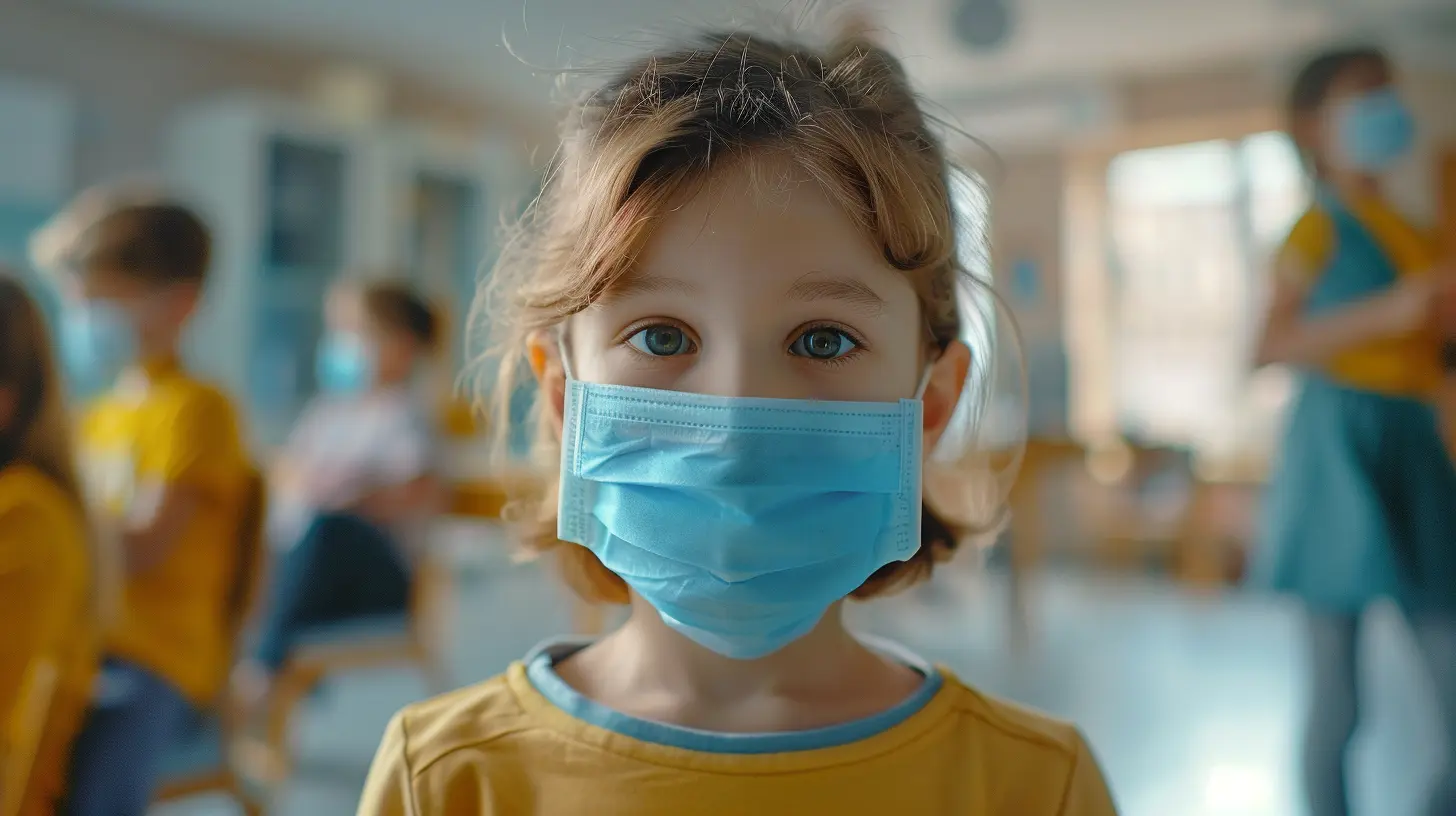7 February 2025
Parenthood is a rollercoaster ride, isn’t it? One moment, your little one is running around with boundless energy, and the next, they’re curled up on the couch with a fever. As parents, nothing tugs at our hearts more than seeing our kids feeling under the weather. Here’s the good news: while we can’t shield our children from every sniffle and sneeze, there’s a lot we can do to prevent some of the most common childhood illnesses.
In this guide, we'll break down practical ways to keep your kiddos healthy and thriving. Ready? Let’s dive in!
Why Do Kids Get Sick So Often?
Ever feel like your child is a magnet for colds and other bugs? It’s not just your imagination. Kids, especially those in daycare or school, are exposed to a ton of germs daily. Their immune systems are still learning the ropes, which makes them more susceptible to infections.Think of it like building muscle—every time their body fights off a virus or bacteria, their immune system gets a little stronger. While this is a natural process, there are proactive steps you can take to minimize illnesses and keep those sick days to a minimum.
The Most Common Childhood Illnesses
Before we jump into prevention, let’s quickly look at what we’re up against. Some of the usual suspects include:- Colds and Coughs: These pesky infections are caused by viruses and are almost impossible to avoid entirely.
- Ear Infections: Painful but common, especially in younger kids.
- Stomach Bugs (Gastroenteritis): You know the drill—vomiting, diarrhea, and lots of laundry.
- Hand, Foot, and Mouth Disease: A viral illness that causes fever, sores, and rashes.
- Strep Throat: A bacterial infection that can cause sore throat and fever.
Knowing what’s out there is half the battle. Let’s talk about how to fight back.
1. Boost Their Immune System
A strong immune system is your child’s best defense. Think of it as their personal superhero squad fighting off germs. So, how do you power them up?Healthy Eating Habits
Make sure their diet includes plenty of fruits, veggies, whole grains, and lean proteins. Foods rich in vitamins like C and D (think: oranges, broccoli, eggs, and fortified milk) can work wonders. And don’t forget probiotics—those little bacteria buddies found in yogurt and fermented foods help keep their gut healthy.Plenty of Sleep
Kids need their Z’s to grow, learn, and fight off illnesses. Aim for the recommended amount of sleep based on their age. For example, toddlers typically need 11–14 hours, while school-aged kids require around 9–12 hours. Need help establishing a sleep routine? Start with consistent bedtimes and limit screen time before bed.Keep Them Hydrated
Water is essential for flushing out toxins and keeping your child’s body running smoothly. Encourage them to drink water throughout the day, and avoid sugary drinks that can suppress immune function.
2. Teach Good Hygiene (Yes, They Can Learn!)
This one’s big, and it’s something we can all agree on: germs are everywhere. Teaching your child good hygiene habits is like giving them an invisible shield.Proper Handwashing
Handwashing is the MVP of germ-fighting! Teach your kids to wash their hands with soap and water for at least 20 seconds—long enough to hum the "Happy Birthday" song twice. Make it a habit before meals, after using the bathroom, and after playing outside.Covering Coughs and Sneezes
No, coughing into their hands won’t cut it. Show your child how to use their elbow or a tissue to cover coughs and sneezes. Bonus points if you can make this habit fun by role-playing or turning it into a game.Keeping Hands Off Their Faces
We know, easier said than done. But touching their eyes, nose, or mouth is a fast-track way for germs to enter their bodies. Gently remind them (without being a nag) to avoid this.3. Keep Their Environment Clean
Your home doesn’t need to be a germ-free fortress, but a few small changes can make a big difference.Regularly Disinfect Surfaces
Focus on high-touch areas like doorknobs, light switches, and toys. A quick wipe with a disinfectant can help stop germs in their tracks.Wash Stuffed Animals and Blankets
Those beloved teddy bears? Yeah, they can harbor germs too. Toss them in the washer now and then to freshen them up.Good Ventilation
Let fresh air circulate by opening windows whenever possible. Poor ventilation can trap germs, making it easier for them to spread.4. Stay Up to Date on Vaccinations
Vaccines are like a security system for your child’s body—they train their immune system to recognize and fight off specific illnesses. Staying on top of their vaccination schedule is one of the most effective ways to prevent serious diseases, like measles or whooping cough.Worried about side effects or safety? Talk to your pediatrician. They’re your go-to resource for answering all your vaccine-related questions.
5. Avoid Overuse of Antibiotics
When kids are sick, it’s tempting to ask your doctor for antibiotics. But here’s the thing: antibiotics only work against bacterial infections, not viruses. Overusing them can lead to antibiotic resistance, making future infections harder to treat.If your child has a simple cold or virus, focus on symptom relief—rest, hydration, and good nutrition—rather than pushing for a prescription.
6. Encourage Physical Activity
Movement isn’t just good for their bones and muscles—it actually strengthens the immune system too. Encourage your kids to get at least an hour of physical activity a day. It doesn’t have to be boring or structured; even a game of tag counts. And hey, join them! It’s a win-win for family bonding and staying active.7. Know When to Keep Them Home
We’ve all been there: juggling work, responsibilities, and a sick kid. But sending your child to school or daycare when they’re unwell can spread illness to others (and might even make their symptoms worse). Keep them home if they have:- A fever (typically above 100.4°F)
- Vomiting or diarrhea
- A persistent cough or sore throat
When in doubt, consult your pediatrician.
8. Be Prepared for Sick Days
No matter how hard we try, kids will get sick from time to time—it’s just part of life. The key is to be prepared.Stock Up on Essentials
Keep a “sick kit” on hand with items like a thermometer, over-the-counter fever reducers (like acetaminophen or ibuprofen), electrolyte drinks, and tissues.Have a Sick Day Plan
If you work, talk with your employer about flexible sick-day options. It’s also a good idea to have a backup caregiver in case of emergencies.The Bottom Line
Parenting is all about balancing prevention with being prepared. While you can’t bubble-wrap your kids from every germ out there, simple habits like proper hygiene, good nutrition, and staying on top of vaccinations can go a long way. And remember, every runny nose and cough they fight off is helping their immune system grow stronger.So, next time you feel overwhelmed, take a deep breath. You’re doing an amazing job, and your efforts to keep them healthy are paying off—one sniffle-free day at a time.










Raelyn Malone
This article provides essential insights for parents on preventing common childhood illnesses. The practical tips and clear explanations empower caregivers to take proactive measures, ensuring their children's health and well-being. A must-read for any parent looking to safeguard their family!
March 31, 2025 at 2:31 AM